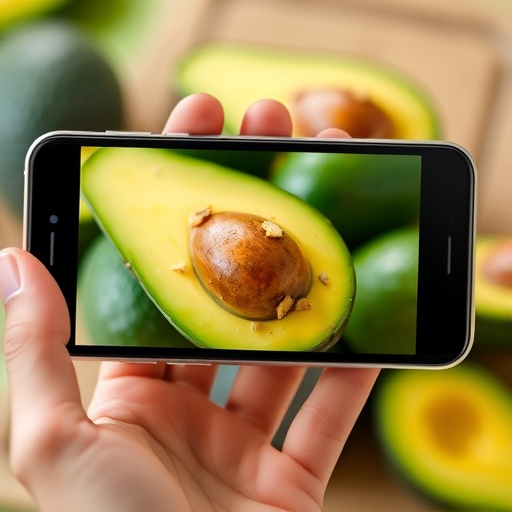A groundbreaking advancement in food science and technology has emerged from Oregon State University and Florida State University researchers, who have developed an innovative smartphone-based artificial intelligence (AI) system designed to accurately predict the ripeness and internal quality of avocados. This state-of-the-art solution addresses a critical challenge in global food supply chains—avocado waste—caused primarily by overripeness and untimely consumption.
Avocados, despite their growing popularity worldwide, suffer from a significant rate of waste as consumers frequently encounter fruit that is either underripe or excessively overripe. This dilemma has driven Luyao Ma, an assistant professor at Oregon State University, to spearhead research that integrates AI with everyday technology like smartphones. Ma explains that the AI tool aims to empower both consumers and retailers with precise, actionable insights into the optimal timing for avocado consumption or sale, facilitating better decision-making and waste reduction.
The research team collected an extensive data set comprising over 1,400 images of Hass avocados, taken exclusively with iPhones to simulate real-world user scenarios. Harnessing these images, they trained deep learning models capable of discerning firmness—a crucial measure of fruit ripeness—with an impressive accuracy of nearly 92%. Additionally, the AI system demonstrated an 84% accuracy rate in detecting internal fruit quality, distinguishing fresh avocados from those affected by internal browning or rot, which are typically invisible to the naked eye before cutting.
This AI-driven approach represents a significant leap from previous methodologies that relied heavily on manual feature extraction and traditional machine learning algorithms. Those earlier techniques often struggled with limited prediction power, constrained by the narrow parameters they could analyze. By contrast, this new research leverages deep learning’s ability to autonomously extract complex features including shape variations, textural nuances, and spatial color patterns, thereby enhancing both the precision and robustness of quality assessments.
Luyao Ma highlighted the practical implications of this technology for consumers, who currently face the uncertainty and frustration of cutting open an avocado only to discover it is overripe and brown on the inside. By empowering users to make informed choices on when to consume or preserve their avocados, this system has the potential to dramatically decrease household food waste, contributing to broader sustainability goals across the food sector.
The utility of this AI system extends beyond the consumer level to commercial operations, including avocado processing plants and retail outlets. In processing facilities, the technology could automate sorting and grading, optimizing supply chain decisions by ensuring that fruit with higher ripeness levels is directed promptly to local markets, thereby reducing spoilage during transport. Retailers could also use these insights to dynamically prioritize sales and inventory management based on real-time quality analysis.
The model’s performance is expected to improve even further as the research continues and more image data are incorporated. The researchers also anticipate the adaptability of their AI system for swelling its application scope beyond avocados. This technology could be instrumental in assessing the ripeness and internal qualities of other perishable commodities, marking a significant step toward ubiquitous, AI-enhanced food quality control.
In achieving these results, the team used convolutional neural networks (CNNs), a deep learning architecture well-suited for image recognition tasks. This allowed for high-level abstraction of visual features, surpassing conventional machine learning models. According to In-Hwan Lee, a doctoral student collaborating on the project, this methodological shift to deep learning enabled the research team to overcome the limitations of prior approaches, which were hampered by hand-crafted feature constraints.
The impetus to focus on avocados was not only driven by economics, given the fruit’s high market value, but also personal experience. Professor Ma expressed her own frequent disappointment over the inability to reliably gauge avocado ripeness before slicing, helping inspire this intersection of AI research and consumer needs. The convergence of personal motivation with global sustainability concerns underscores the innovative spirit fueling this project.
Food waste represents a critical global issue, with approximately 30% of all food produced worldwide being discarded—a major inefficiency that burdens economies and ecosystems. National initiatives like those set forth by the U.S. Department of Agriculture and Environmental Protection Agency strive to halve food waste by 2030, making technological innovations like this AI system timely and essential.
What makes this research particularly notable is its potential to catalyze a paradigm shift in food quality assessment: moving from subjective, experience-based judgments to precise, AI-assisted decision-making processes that are accessible through widely available devices like smartphones. This democratization of food science could transform both the consumer experience and supply chain management, ultimately fostering a more sustainable and efficient food ecosystem.
These findings were recently published in the peer-reviewed journal Current Research in Food Science, signaling a significant contribution to the scientific community’s efforts to harness machine learning for practical food science applications. Funding and collaboration between Oregon and Florida State Universities reflect a multidisciplinary approach combining food science, engineering, and computer science expertise.
Looking ahead, the research team is exploring ways to refine and expand the technology for broader consumer adoption. Integration with smartphone apps that provide user-friendly interfaces and real-time analysis could revolutionize how individuals and businesses manage fresh produce. This innovation signifies not just a technical achievement but a promising step toward mitigating food waste on a global scale.
Subject of Research:
Artificial intelligence application for non-destructive prediction of avocado ripeness and internal quality.
Article Title:
Smartphone-based AI system accurately predicts avocado ripeness and internal quality.
Web References:
https://www.sciencedirect.com/science/article/pii/S2665927125002278
References:
Ma, L., Lee, I.-H., & Lee, Z. (2024). Deep learning approaches for avocado quality assessment. Current Research in Food Science.
Image Credits:
Brian Horne, Oregon State University
Keywords:
Artificial intelligence, deep learning, avocado ripeness, food waste reduction, smartphone technology, food quality prediction, machine learning, non-destructive testing, convolutional neural networks, sustainable food supply chain.




